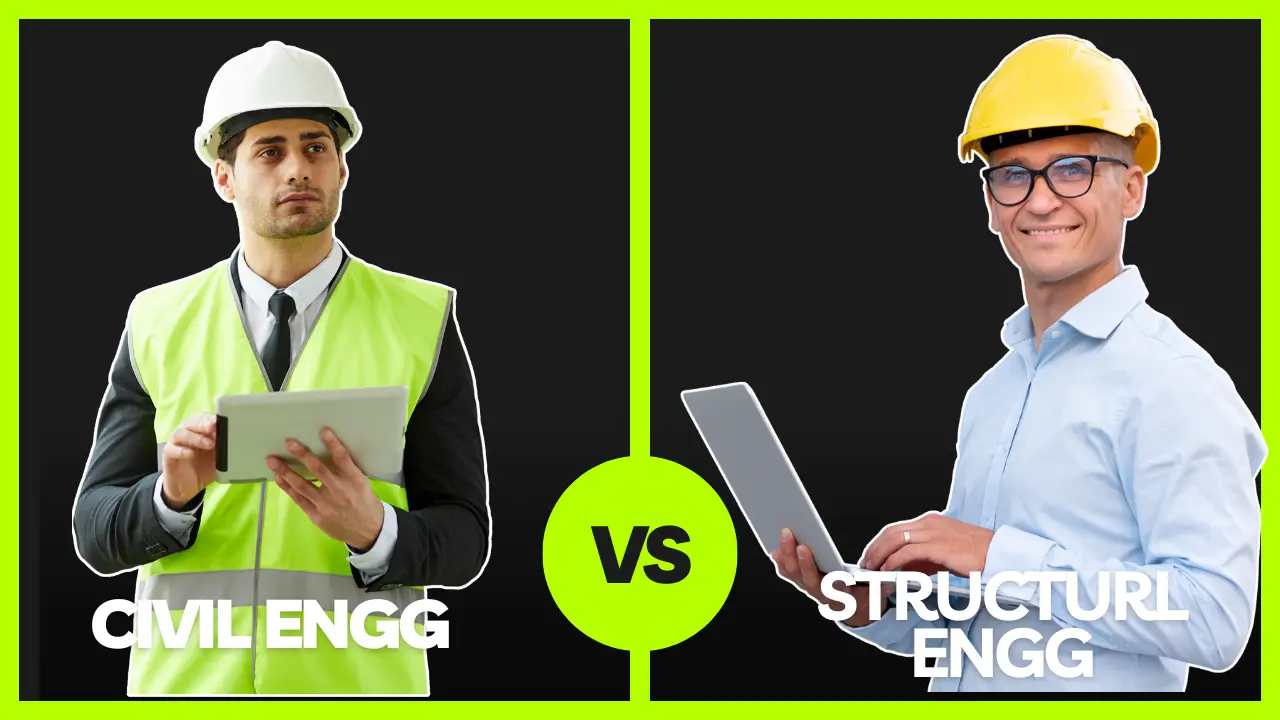In the realm of engineering, civil and structural disciplines shape our world. This blog explores their unique traits, responsibilities, and contributions, sparking the debate on who excels.
Delve into the distinctions, uncover strengths, and understand the vital roles these experts play in construction and infrastructure development.
Civil Engineers vs Structural Engineers – Simple Difference between In Simple Way
In a Simple way for you!
| Aspect | Civil Engineers | Structural Engineers |
|---|---|---|
| Primary Focus | Plan and oversee a variety of infrastructure projects, including roads, bridges, and water systems. | Design and analyze the structural components of buildings and infrastructure. |
| Scope of Work | Cover a broad range of civil projects, addressing overall project planning and execution. | Specialize in the design and analysis of structural elements to ensure safety and stability. |
| Key Responsibilities | Consider overall project feasibility, environmental impact, and regulatory compliance. | Focus on structural integrity, material selection, and adherence to building codes and standards. |
| Materials Involved | Work with diverse materials, including concrete, asphalt, and steel, for infrastructure projects. | Primarily deal with materials like steel, concrete, and wood for structural components. |
| Common Analysis Tools | Utilize various tools for project management, environmental analysis, and civil engineering software. | Use structural analysis software, finite element analysis, and engineering principles. |
What is Civil Engineering?

Civil engineering is a broad and versatile field that encompasses various sub-disciplines, including transportation, water resources, environmental engineering, geotechnical engineering, and more. Civil engineers are the masterminds behind the conception, planning, and execution of projects that enhance the quality of life for communities.
1. Versatility of Projects:
Civil engineers are involved in diverse projects, ranging from designing transportation systems and managing water resources to planning urban development and overseeing environmental initiatives. Their work extends beyond individual structures, focusing on the overall functionality and sustainability of communities.
2. Holistic Approach:
The hallmark of civil engineering lies in its holistic approach to projects. Civil engineers consider the broader context of infrastructure development, addressing the interconnections between various components to create comprehensive solutions that benefit society at large.
You May Also Like: Best Laptops For Civil Engineers
What is Structural Engineering?

Structural engineering, on the other hand, is a specialized branch of civil engineering that concentrates specifically on the design and analysis of structures to ensure their safety and stability. Structural engineers collaborate closely with architects to transform creative visions into tangible, resilient constructions.
1. Focus on Structural Integrity:
The primary emphasis of structural engineering lies in understanding the behaviour of materials and applying this knowledge to design structures capable of withstanding various loads, including gravity, wind, earthquakes, and other environmental factors. Structural engineers play a critical role in ensuring the safety and stability of buildings, bridges, and other structures.
2. Precision in Design:
Structural engineers delve deeply into the intricacies of designing individual structures, focusing on the detailed calculations necessary to meet safety standards and structural integrity requirements. Their expertise lies in translating architectural concepts into practical, robust designs.
Contrasting Characteristics Of Civil Engineers vs Structural Engineers:
To determine which engineering discipline is “better,” it’s essential to understand the distinctive characteristics that set civil and structural engineers apart. Both contribute significantly to the construction industry, but they do so in different ways.
1. Breadth vs. Depth:
Civil engineering embraces a broad spectrum of projects, requiring a comprehensive understanding of various sub-disciplines.
Civil engineers must be adept at navigating the complexities of transportation, water management, environmental considerations, and more.
In contrast, structural engineering focuses on depth, honing in on the intricacies of designing and analyzing individual structures with specialized knowledge of materials and structural behaviour.
2. Planning vs. Detailing:
Civil engineers are often involved in the initial planning stages of projects, considering the overall layout and functionality of infrastructure. They collaborate with urban planners, architects, and other professionals to create the overarching framework. Structural engineers, on the other hand, focus on the detailed design and analysis of specific components, ensuring they meet safety standards and structural integrity requirements.
Educational Paths For Civil Engineers vs Structural Engineers:
Understanding the educational paths of civil and structural engineers provides insights into the depth of knowledge each possesses in their respective fields.
1. Civil Engineering Education:
Civil engineers typically earn a bachelor’s degree in civil engineering, covering a broad range of topics. The curriculum includes coursework in transportation engineering, environmental engineering, geotechnical engineering, and more. Civil engineers may choose to specialize further during their professional careers.
2. Structural Engineering Specialization:
While civil engineering serves as the foundation, structural engineers pursue additional coursework or a master’s degree specifically in structural engineering. This specialized education equips them with the in-depth knowledge required for the detailed design and analysis of structures.
You May Also Like: Best Laptops For Structural Engineers
Collaborative Dynamics Civil Engineers vs Structural Engineers
Effective collaboration between civil and structural engineers is essential for successful project outcomes. Their complementary roles ensure that infrastructure projects are not only aesthetically pleasing but also structurally sound and functional.
1. Collaborative Projects:
Civil and structural engineers often work hand-in-hand from the project’s conceptualization to its completion. Civil engineers provide the overall project framework, considering the broader implications on communities, while structural engineers contribute the detailed designs necessary to bring the architectural vision to life.
2. Communication:
Clear communication between civil and structural engineers is vital to address the challenges that may arise during the planning and construction phases. Collaborative efforts help streamline the decision-making process, ensuring that projects are executed efficiently and safely.
Technological Advancements:
Technology advancements have significantly impacted how civil and structural engineers approach their work. Both disciplines benefit from innovative tools and software that enhance efficiency, accuracy, and sustainability in engineering projects.
1. Building Information Modeling (BIM):
BIM is a collaborative approach that allows engineers to create digital representations of a project, facilitating better coordination and communication among various stakeholders. Civil and structural engineers alike benefit from BIM in streamlining the design and construction processes, ensuring seamless collaboration.
2. Finite Element Analysis (FEA):
Structural engineers, in particular, leverage FEA software to simulate and analyze the behaviour of structures under different conditions. This advanced technology enables them to optimize designs, ensuring that structures can withstand various loads and environmental factors.
Environmental Sustainability:
In the contemporary era, environmental sustainability is a critical consideration in engineering projects. Both civil and structural engineers play pivotal roles in developing solutions that minimize the environmental impact of infrastructure.
1. Sustainable Design in Civil Engineering:
Civil engineers incorporate sustainable practices into urban planning, water resource management, transportation systems, and other areas. Their focus is on creating environmentally friendly solutions that benefit communities over the long term.
2. Sustainable Structures in Structural Engineering:
Structural engineers contribute to sustainability by designing environmentally friendly structures. This includes the use of energy-efficient materials, optimizing designs for minimal environmental impact, and ensuring that structures are resilient in the face of climate change challenges.
Resilience and Adaptability:
As climate change poses new challenges, civil and structural engineers are tasked with developing resilient and adaptable infrastructure. This includes designing structures that can withstand extreme weather events, rising sea levels, and other climate-related factors.
1. Civil Engineering and Resilience:
Civil engineers address resilience at the community level, planning and implementing infrastructure that can withstand natural disasters and changing environmental conditions. This may involve designing robust drainage systems, flood protection measures, and sustainable urban development.
2. Structural Engineering and Adaptability:
Structural engineers contribute to adaptability by designing structures that can be modified or retrofitted to meet changing needs. This includes considerations for future expansions, renovations, and potential changes in building use.
Determining Excellence:
The question of which engineering discipline is “better” is nuanced and depends on the context of the project and its requirements. Rather than a competition, the collaboration between civil and structural engineers is what leads to successful and sustainable outcomes.
1. The Importance of Collaboration:
Both civil and structural engineers bring indispensable skills to the table. Civil engineers provide the overarching vision, ensuring that infrastructure meets the needs of communities and aligns with broader development goals. Structural engineers contribute their specialized knowledge to design structures that are safe, durable, and architecturally sound.
2. Project-Specific Considerations:
The determination of which discipline is better often boils down to the specific requirements of a project. In projects where a holistic understanding of communities and urban planning is crucial, civil engineers may take the lead. In contrast, for projects where structural integrity and detailed design are paramount, structural engineers play a central role.
3. Synergy for Success:
Ultimately, the synergy between civil and structural engineers is key to project success. By fostering a collaborative environment and recognizing the strengths each discipline brings, engineers can work together seamlessly to create infrastructure that is not only functional and safe but also environmentally sustainable.
Conclusion:
In the realm of engineering, the question of whether civil engineers are better than structural engineers, or vice versa, oversimplifies the intricate dynamics of these disciplines.
Civil and structural engineers are not in competition; rather, they are integral parts of a collaborative effort that shapes the world we live in.
Their unique strengths and expertise converge to create an infrastructure that stands the test of time, enhances communities, and adapts to the evolving needs of society.
The excellence of a project lies not in favouring one discipline over the other but in recognizing the value each brings to the table and harnessing their collective potential for the greater good.
You May Also Like:
Structural Engineers vs Project Managers: Who Is Better
Structural Engineers vs Surveyors: Who Is Better
10+ Best Laptops For Civil Engineers & Students
10+ Best Tablets For Civil Engineers (Top Picks Only)




